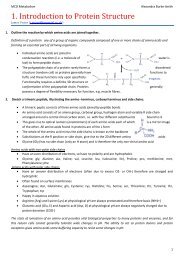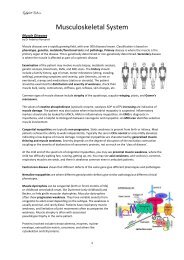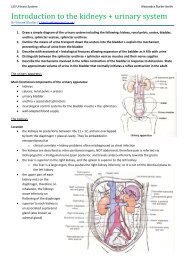1. Introduction to Medical Sociology
1. Introduction to Medical Sociology
1. Introduction to Medical Sociology
Create successful ePaper yourself
Turn your PDF publications into a flip-book with our unique Google optimized e-Paper software.
FOCP Alexandra Burke-Smith<br />
→The internal market 1991<br />
� District Health Authorities main purchasers<br />
� Major acute hospitals and other NHS providers became ‘Trusts’<br />
� GP fund holders<br />
� Non-emergency hospital outpatients<br />
� Diagnostics<br />
� Pharmaceutical care<br />
� Aim was <strong>to</strong> bring benefits of competition and efficiency without jeopardising initial principles<br />
� Professional Accountability:<br />
- <strong>Medical</strong> audit (systematic analysis of the quality of clinical care) made compulsory in hospitals and general<br />
practice.<br />
- Hospital consultants had clinical time commitments in NHS set out in job descriptions.<br />
- General managers involved in appointment of new consultants and in the allocation of merit awards, i.e. a<br />
Management hierarchy<br />
- Increased changes <strong>to</strong>wards private sec<strong>to</strong>r management model. Health authorities became managerial<br />
bodies akin <strong>to</strong> the boards of direc<strong>to</strong>rs of private companies<br />
� Management hierarchy<br />
- Increased changes <strong>to</strong>wards private sec<strong>to</strong>r management model<br />
- Health authorities became managerial bodies<br />
� General Practice<br />
- New contract in 1990<br />
- Preventative activities<br />
- Degree of competition between practices<br />
- Cost-effectiveness of services<br />
- Changes <strong>to</strong> capitation payments<br />
- Activity targets<br />
- Subsidies <strong>to</strong> employ additional staff<br />
- Indicative prescribing budgets<br />
Impact<br />
� Incentives <strong>to</strong>o weak and constraints <strong>to</strong>o strong<br />
� Increase in administrative and management costs<br />
� Equity – but ‘two-tier’ system in GP<br />
� Altered the operating culture of the NHS and balance of power between managers and health care<br />
professionals and hospital providers and GPs<br />
� Exposed long standing issues – e.g. rationing<br />
� No obvious indica<strong>to</strong>rs that the internal market system had damaged standards of patient care – less<br />
waiting times due <strong>to</strong> negotiations, public dissatisfaction initially fell in the 1990’s as more money was put<br />
in<strong>to</strong> the NHS but resumed its steady upward trend in the later 90s.<br />
� Regarding choice and responsiveness <strong>to</strong> the demands of the patient – there was little evidence of change<br />
and that the pts had been allowed <strong>to</strong> express their ‘voice’ even though (fundholding) GPs were supposedly<br />
acting on patients’ behalf.<br />
14







